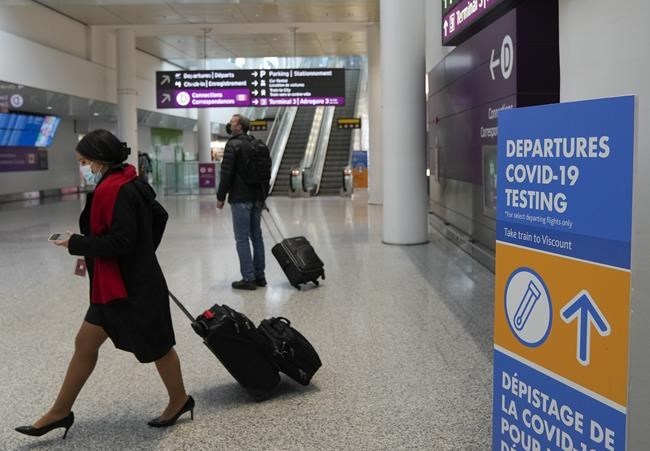HALIFAX — When Halifax-based blogger and social media influencer Kayla Short pulled up to a Canada-U.S. land border last month, she was prepared.
She had all her receipts from her one-week trip to Boston along with her travel documents, proof of vaccination and a negative COVID-19 test from the day before ready to show Canadian officials at the Calais, Maine, crossing.
What Short wasn't prepared for was to be selected for a mandatory COVID-19 arrival test — less than 24 hours after completing her last test.
The federal government has awarded three companies with contracts worth up to $631 million for COVID-19 border testing and other screening services as concerns about the Omicron variant deepen ahead of the busy holiday travel period.
Public Services and Procurement Canada said Switch Health, LifeLabs and Dynacare are carrying out testing of international travellers entering Canada at airports and land border crossings.
The random arrival testing program is part of broader COVID-19 screening and testing being rolled out by the three companies.
While air travellers selected for additional screening are usually directed to an on-site clinic for a test, travellers crossing land borders are usually handed a test to self-administer.
Short said while the intentions of the program are "good on paper," she said trying to complete a test during a pit stop at a New Brunswick hotel room with unreliable internet was "cumbersome and overwhelming."
"The whole thing took me probably two hours from creating an account online and then waiting 45 minutes to speak to someone over a video call with spotty Wi-Fi so they could walk me through the test," she said. "Then the next day we had to do a detour in Moncton to find a Purolator drop-off box."
Health Canada said it was working on responding to questions about the COVID-19 arrival testing program sent to the department last week. However, a response was not received before deadline on Monday.
Public Services and Procurement Canada spokesman Gabriel Leboeuf said Switch Health, LifeLabs and Dynacare provide comprehensive border testing services, including appointment booking, test administration and results management.
They also provide further testing support for temporary foreign workers, refugees, asylum seekers and international students, he said
Switch Health is responsible for testing in Ontario, Alberta and Atlantic Canada, with a contract value worth up to $440 million.
LifeLabs is providing testing services in British Columbia, Saskatchewan and Yukon with a contract worth up to $111 million, and Dynacare is operating in Quebec and Manitoba with a contract worth up to $80 million.
"As of November 30, 2021, the total approved value of the border testing contracts is approximately $631 million," Leboeuf said in an email. "However, since companies are paid for services delivered, this amount may not be fully spent."
Jordan Paquet, vice-president of public affairs with Switch Health, said most of the company's randomized arrival testing at airports is done on-site.
He said the Canada Border Services Agency will put a sticker on a traveller's passport or travel document indicating whether they can proceed directly to baggage claim or stop at the testing site first.
At land border crossings, however, Paquet said travellers who are selected for random screening are provided with a test kit to take with them.
"It would get massively backed up if we stopped people to do the tests in person, especially at the bigger land border crossings like the Detroit-Windsor bridge," he said.
Travellers complete the at-home tests with the help of a Switch Health employee through a video call. They are then directed to put the test in an envelope provided and then in the mail.
"The validity of a test is going to be more guaranteed if someone is proctoring it online," he said. "It ensures accuracy."
Paquet said the average wait time to be connected with a Switch Health official online is 15 minutes, making Short's wait time of 45 minutes longer than usual.
Still, while he acknowledged the inconvenience of being selected for additional testing, he pointed out that self-administering a test from a hotel room is likely preferable for many to standing in line at a testing centre.
Meanwhile, Paquet said the pandemic has shone a light on some of the gaps in the health-care system and has shown that companies like Toronto-based Switch Health can work with governments to improve patient experiences.
"We're not there to replace anything in the health-care system," he said. "Our whole goal as a company is to deliver better health care in general for Canadians and more decentralized diagnostics."
This report by The Canadian Press was first published Dec. 6, 2021.
Brett Bundale, The Canadian Press



